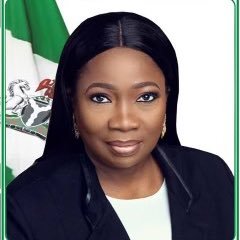
By Collins Nweke
The recent uproar over a social media post shared by the Chairperson of the Nigerians in Diaspora Commission (NiDCOM), Mrs. Abike Dabiri-Erewa, which described the Igbo ethnic group in derogatory terms, has once again brought to the surface Nigeria’s fragile ethnic relations and the responsibilities of those entrusted with public office.
This is not the first time Mrs. Dabiri-Erewa has been accused of making ethnically charged remarks, nor is it likely to be the last such controversy involving a public official. But to focus on personalities is to miss the bigger picture. The real issue is deeper and more systemic. Rather than fall on the defence of prosecution side of the divide, we should be asking the deeper question. In my view, that question is: why do Nigerian public officials repeatedly exhibit insensitivity on matters of ethnicity and identity without consequences?
Words matter, especially in public office
In a nation of over 250 ethnic groups, language is not neutral. Every public utterance, especially from those occupying sensitive offices, carries weight. A careless word can inflame long-standing distrust, harden stereotypes, and deepen divisions.
Public servants must understand that they are custodians of institutional voices, not private citizens wielding personal opinions. Their statements, online and offline, are signals of state policy to Nigerians and the world. Public office is bigger than the individual. Every utterance carries the weight of the nation.
The perils of reflexive defensiveness
Perhaps equally troubling is the pattern of reflexive defence from supporters whenever public officials err. Rather than seeking accountability, many leap to protect “our own, our friend, our ally”. This is particularly so when the act is indefensible.
Take, for instance, some individual leaders and groups particularly of Igbo ethnicity, chosen obviously for high impact, have taken to the same social media in the last hours. Their interventions unscore attempts to justify rather than interrogate the NiDCOM conduct in question. This culture of automatic defence, driven by politics, patronage, or identity, undermines national cohesion. You cannot build a united Nigeria if truth becomes a casualty of loyalty. Defending wrongdoing because of shared identity or interests is a betrayal of Nigeria’s collective progress.
The accountability vacuum
In many countries, a senior public servant accused of ethnic bias would face swift consequences:
- Immediate suspension pending investigation.
- Public apology issued transparently.
- Corrective measures, including retraining or dismissal where warranted.
In the UK, ministers have resigned over a misplaced phrase. In the US, officials have lost careers over perceived racial insensitivity. Yet in Nigeria, the absence of institutional guardrails means that controversies blow over, lessons aren’t learned, and the cycle of impunity continues.
Systemic gaps that enable ethnic missteps
This latest NiDCOM controversy highlights several structural deficiencies:
- Lack of mandatory training
Few public officials undergo structured education on Nigeria’s ethnic dynamics or on inclusive language.
- Weak institutional oversight
Parliament rarely enforces sanctions or demands apologies when agency heads cross the line.
- Weaponisation of ethnicity
Politicians exploit ethnic identities to mobilise loyalty and deflect accountability.
- Social media amplification
In the digital age, a single post can ricochet across communities and diasporas within minutes, worsening tensions.
Recommendations for governance reform through ethnic sensitivity code of conduct
Nigeria does not lack rules, but it lacks enforced frameworks tailored to today’s realities. Here are five urgent steps to consider if governance of Nigeria’s diverse ethnicity is to be reformed:
- National code of conduct on ethnic sensitivity
Develop a legally enforceable code binding on all public officeholders:
- Prohibits ethnically charged language.
- Governs social media use.
- Ensures dignity in representing state institutions.
- Mandatory diversity & inclusion training
Before assuming sensitive offices, all senior appointees should complete:
- Ethnic Relations Certification – understanding Nigeria’s plural realities.
- Digital Citizenship Training – how to navigate social media responsibly.
- Conflict Sensitivity Coaching – strategies for crisis communication.
- Graduated sanctions for misconduct
- First offence: Written warning and retraining.
- Repeat offence: Suspension without pay.
- Severe breaches: Dismissal and possible barring from future appointments.
- Independent ethics oversight
Establish an Ethics and Accountability Panel reporting directly to the Presidency and National Assembly, empowered to:
- Investigate allegations promptly.
- Recommend sanctions transparently.
- Publish periodic reports to the public.
- Diaspora-Led Civic Capacity Building
Given their exposure to multicultural societies, Nigeria’s Diaspora networks can play a role by:
- Facilitating cross-country learning on ethnic sensitivity.
- Partnering with NIDO, and civil society to run capacity-building workshops.
- Promoting a culture of inclusive leadership through research and advocacy.
A call for leadership
This is not about Mrs. Dabiri-Erewa alone. It is about our institutions, our collective values, and our national future. Nigeria cannot afford to normalise insensitivity at the highest levels of governance. A public office is a public trust. Words must be weighed carefully, and actions must be accountable. Unity cannot be legislated into existence; it must be nurtured, through empathy, responsibility, and consequence. If we are serious about nation-building, then the NiDCOM controversy should be a turning point, not another missed opportunity.
About the Author
The author, Collins Nweke is an International Trade Consultant & Economic Diplomacy researcher. He was a former Green Councillor at Ostend City Council, Belgium, where he served three consecutive terms until December 2024. He is a Fellow of both the Chartered Institute of Public Management of Nigeria and the Institute of Management Consultants. He is also a Distinguished Fellow of the International Association of Research Scholars and Administrators, serving on its Governing Council. A columnist for The Brussels Times, Proshare, and Global Affairs Analyst with a host of media houses, Collins writes from Brussels, Belgium. X: @collinsnweke E: admin@collinsnweke.eu W: www.collinsnweke.eu









